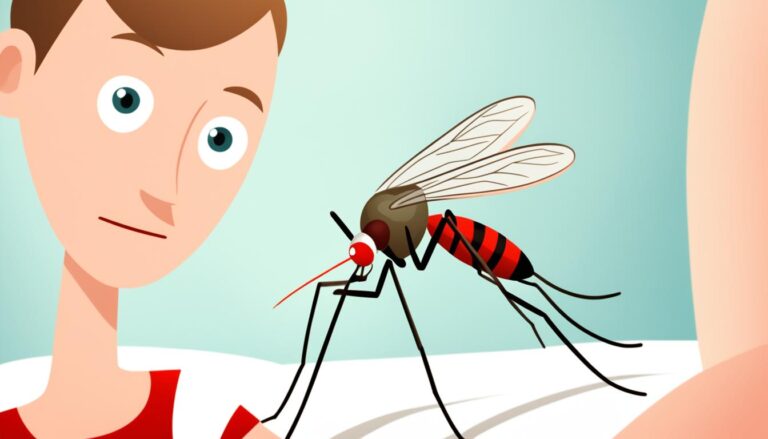Seeing your baby cough can be worrying, but there are safe, natural ways to help. Check out a full guide on soothing your baby’s cough. It covers staying hydrated, using nasal saline drops, adding humidity, and even honey. These gentle methods can make your baby feel better and stay healthy in the early months.
Key Takeaways
- Explore a variety of safe and natural home remedies to soothe your infant’s cough
- Learn how to effectively use nasal saline drops to clear congestion
- Discover the benefits of adding humidity and incorporating honey for cough relief
- Understand the importance of staying hydrated and providing comforting warm liquids
- Recognize the role of sleep and rest in supporting your baby’s immune system
The Importance of Addressing Cough in Infants
Coughing is common in infants because their immune systems and airways are still developing. It’s important to take action quickly to avoid risks like poor sleep, dehydration, and spreading infections.
Understanding Cough in Infants
Cough helps clear the airways of things like mucus, dust, or viruses. In babies, coughing can mean they have a cold, allergies, or a serious illness. Knowing what causes a baby’s cough helps parents take the right steps to help them.
Potential Risks of Untreated Cough
- Disrupted sleep: A persistent cough can keep babies awake, making them tired and cranky.
- Dehydration: Coughing can cause babies to lose fluids, so it’s key to keep them hydrated.
- Spread of infections: Not treating coughs can let viruses or bacteria spread to others, putting the baby and their family at risk.
Quick action is key to prevent these risks and keep babies comfortable and healthy. Knowing how to treat a baby’s cough is the first step to using home remedies and getting medical help when needed.

Staying Hydrated: Fluids as a Natural Remedy
Keeping your baby hydrated is key to helping them manage their cough. Breast milk or formula can thin out secretions, making it easier for them to cough and breathe. Offering water or unsweetened juices can also help with hydration, supporting their health and recovery.
Hydration is vital for controlling baby’s cough. When they cough, their body works hard to get rid of mucus and clear their airways. Drinking fluids helps thin out secretions, making coughing and breathing easier.
You can give your baby small sips of water or unsweetened juices to help with cough relief. This is great if they’re having trouble nursing or feeding because of their cough.
Hydration is crucial for cough relief. It helps thin out mucus, reduces inflammation, and supports their immune system as they fight the cough’s cause.

Remember, hydration is just part of managing your baby’s cough. Always watch their symptoms, comfort them, and talk to your pediatrician if the cough gets worse or doesn’t go away.
Nasal Saline Drops: Clearing Congestion Safely
When your little one has nasal congestion, saline drops or sprays can help. They make mucus thinner and easier to breathe through. Plus, you can make a safe saline solution at home.
Preparing Saline Solution at Home
Making a saline solution for your baby is easy. You just need half a teaspoon of salt and a cup of warm, purified water. Stir until the salt dissolves completely. This solution can clear your baby’s nasal congestion.
Using Saline Drops Effectively
- Use a clean dropper to put a few drops of the saline solution into each nostril.
- Then, use a bulb syringe or nasal aspirator to remove the loosened mucus.
- Do this a few times a day to keep your baby’s nasal passages clear.
Using saline drops for baby congestion and homemade saline solution for infants is safe and effective. It helps your little one breathe better. Just make sure to properly use nasal saline drops for the best results.

Home Remedies For Cough In Infants
When your little one has a cough, you want to help them feel better. Besides keeping them hydrated and using saline drops, there are other home remedies that can ease their cough. These gentle, natural ways can really help your baby feel more comfortable and recover faster.
Adding humidity to the air is a great remedy. A cool-mist humidifier can make breathing easier for your baby by loosening mucus. Just remember to clean the humidifier often to stop bacteria from growing.
For babies over 1 year, a spoonful of honey can be very helpful. Honey has properties that help stop coughs and soothe your baby. But don’t give honey to babies under 1 year because it can cause botulism.
Warm liquids like chicken soup can also ease your baby’s cough. The warmth and steam help thin out mucus and soothe the throat. The broth’s nutrients also support your baby’s health.
Always talk to your pediatrician before trying home remedies, especially for young babies. With their advice and these gentle, natural methods, you can help your baby feel better and be happy and healthy again.

The Benefits of Humidity and Steam
Keeping the right humidity levels can really help a coughing baby. Using a cool-mist humidifier in the nursery keeps your baby’s nose moist and clear. This makes it easier for them to breathe and sleep well. The extra moisture helps ease a baby’s cough by loosening mucus.
Using a Cool-Mist Humidifier
Cool-mist humidifiers are safer for babies than warm-mist ones because they lower the chance of burns. Both types add moisture to the air, but cool-mist ones are better for babies. They don’t offer more benefits for cough relief than cool-mist ones.
To keep your humidifier safe and working right, clean it often. Empty and dry the tank, and use clean water to avoid mineral buildup. This stops bacteria and molds that can make breathing harder.
For more relief, try making a steam room by taking a hot shower and sitting with your baby in the steam. The steamy air can help clear your baby’s congestion, making breathing easier.
Honey: A Sweet Relief for Coughing
Honey can be a natural way to soothe a cough in infants over 1 year old. It’s a sweet liquid that can help heal. Studies show honey works better than over-the-counter cough medicines for reducing coughing at night and helping children sleep better when they’re sick.
The thick texture of honey can soothe a sore throat. Its antibacterial and anti-inflammatory properties can thin out mucus, making it easier to cough up. This can bring relief to infants with a bothersome cough.
Using honey to soothe a cough in infants has many benefits:
- Coats and soothes the throat, providing relief
- Thins out mucus, making it easier to cough up
- Has natural antibacterial and anti-inflammatory properties
- More effective than over-the-counter cough medicines
- Helps improve sleep for sick children
But remember, don’t give honey to infants under 1 year old because of the risk of botulism. For babies over 1 year, a teaspoon of honey for baby cough can be a sweet, natural way to ease their cough.

Chicken Soup and Warm Liquids: Comforting and Soothing
When your little one has a cough, warm liquids can bring relief. Chicken soup is a great choice. It’s been a trusted remedy for generations to help with cold and flu.
The Science Behind Chicken Soup
Chicken soup has anti-inflammatory properties that can lessen coughing. The warm broth helps thin out mucus, making it easier for your baby to breathe. For babies on solids, blend the soup into a smooth puree for easy swallowing.
Other warm liquids like herbal tea or diluted fruit juice can soothe a baby’s cough. They help loosen mucus and ease throat pain.
Keeping your baby hydrated is key when they’re coughing or cold. Offering warm liquids can ease their symptoms and support their health and recovery.
Sleep and Rest: Supporting the Immune System
When your baby has a persistent cough, it’s key to focus on their sleep and rest. Good sleep helps their immune system work well and fight the virus. By making sure they get enough rest, you help them recover faster.
Here are some tips to help your baby sleep better:
- Use saline drops and a bulb syringe to clear their nasal passages before naps and bedtime. This can make it easier for them to breathe and fall asleep.
- Provide plenty of comforting cuddles and a soothing environment to help them relax and drift off to sleep more easily.
- Establish a consistent bedtime routine to signal to your baby that it’s time to wind down and get the rest they need.
When your baby’s immune system is well-rested, it can fight the virus better. By focusing on sleep and rest, you’re supporting their body to recover and feel better soon.
Conclusion
Using safe, natural home remedies can help soothe your baby’s cough. Simple steps like keeping your baby hydrated with fluids and using saline drops can make a big difference. These solutions offer relief and comfort to your little one.
Always watch your baby’s symptoms closely. If the cough lasts more than a week or gets worse, see a doctor. They can help if your baby has trouble breathing or a high fever.
Key tips for managing cough in babies include keeping them hydrated, using saline drops, and creating a humid environment. These steps help your baby breathe easier and rest well. Knowing when to see a doctor for a baby’s cough is important. Always seek professional advice if the cough gets worse or doesn’t go away.
FAQ
What are some safe and natural home remedies for soothing an infant’s cough?
For an infant’s cough, try keeping them hydrated and using nasal saline drops. Add humidity to the air and give warm liquids like chicken soup. For babies over 1 year old, honey can also help.
Why is it important to address cough in infants?
Coughing in infants can disrupt their sleep and lead to dehydration. It can also spread infections. So, it’s key to treat the cough quickly for your baby’s health.
How can staying hydrated help manage an infant’s cough?
Hydrate your baby with breast milk, formula, water, or unsweetened juices. This helps thin out secretions, making it easier for them to cough and clear their airways.
How do nasal saline drops work to relieve congestion in infants?
Nasal saline drops or sprays clear out mucus in the nasal passages. This makes breathing and coughing easier. You can make a saline solution at home and use a bulb syringe or nasal aspirator to remove the mucus.
What other home remedies can help soothe an infant’s cough?
Other than staying hydrated and using saline drops, try adding humidity with a cool-mist humidifier. For babies over 1 year old, honey can also help. Offering warm liquids like chicken soup is another option.
How can humidity and steam help relieve an infant’s cough?
Humidity in the air, from a cool-mist humidifier or a steam room, keeps nasal passages moist. This makes breathing and resting easier for your baby.
What are the benefits of using honey to soothe an infant’s cough?
For babies over 1 year old, honey can calm a cough. It coats the throat, soothes irritation, and thins mucus for easier coughing.
How can warm liquids like chicken soup help ease an infant’s cough?
Warm liquids like chicken soup can reduce cough inflammation and thin mucus. They soothe discomfort. For infants starting solids, blend the broth into a smooth puree.
Why is sleep and rest important for an infant with a cough?
Sleep helps your baby’s immune system fight the cough virus. Use saline drops, comfort your baby, and create a calm space for better rest and recovery.





Leave a Comment